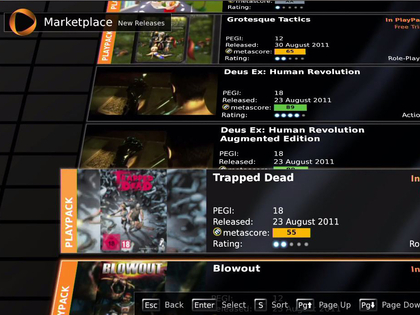8 brilliant gadgets that totally failed to launch
What would an alternate universe look like where Microsoft dominated with a slick newspaper-ready tablet, HP had won the smartphone wars, and we were all carrying around a Palm Foleo?
Well, it'd certainly be one that is not quite so Apple-centric. And what's more, it could have happened.
These gadgets and gizmos almost made it into the limelight, but never made it into stores.
They at least offered something new or unusual, but while some never made it past the concept stage, others were announced but never actually made it onto the street.
1. Microsoft Courier
This rather famous failure comes directly from Redmond. Billed as a digital journal, and seen mostly through conceptual mock-ups, the Courier had the makings of a stellar tablet: the Nvidia Tegra processor, lightweight (less than a kilogram), and running Windows CE 6.
The main problem with the device was that, back in March of 2010, rumours started flying about Android touch tablets. The Courier was a style-based device similar to previous Tablet PCs. Still, at 5x7-inches and rumors of some big name content providers, the Courier could have been a contender but Gates killed it. And, if the Kindle Fire has proved anything, it's that a palm-sized tablet can attract attention by emphasising content over features.
[Image credit: Gizmodo]
2. Nokia 600
Considered by many to be the last great effort to keep Symbian alive, the Nokia 600 looked to be a worthy touchscreen phone with a bright, 3.2-inch screen. Many of the specs match up well with Android models: a 5MP camera, support for 32GB flash cards, and a 1GHz processor.
Yet, the phone died quickly right around the time that Nokia started talking to Microsoft about using the Windows Phone 7 OS. Now, the big push for CES: Nokia is reinventing their smartphones sans Symbian.
3. Plastic Logic Que
One of several dozen ebook readers that were supposed to change the world, the Plastic Logic Que was a leading candidate. First seen at CES 2010, the device had a crisp 8.5 x 11 screen and a thin design, but the killer feature was that this e-reader was also a good document manager.
The Que was supposed to let you open Microsoft Office documents, PDF files, and magazines. Another unusual feature: you could sync with your desktop Outlook email. That seems quaint in the age of cloud email, but the Que did look impressive. Unfortunately, it was also overpriced compared to the iPad.

4. Panasonic Jungle
One lesson when it comes to new gadgets: make sure you inspect the photos and early concept videos. It's important to look for an actual interface, not just a full-screen videogame screenshot that someone Photoshopped into place.
The Panasonic Jungle had a full QWERTY keyboard, which could have been a boon for the MMO crowd (e.g., those addicted to Warcraft-like role-players). Alas, the Jungle was yet another incident of roadkill created by the more versatile Apple iPad 2.

5. BlackBerry PlayBook 4G
Whatever happened to the PlayBook 4G? Just a year ago, Research in Motion had trumped up the original PlayBook as the business-centric tablet for those who think the iPad is too consumer-oriented. You can sync your BlackBerry securely to read email or connect over Wi-Fi. Yet, even though US carriers were ready to sign on to provide 4G service, the PlayBook never really caught fire.
6. Sharp Galapagos 10.8-inch
We were all set to start praising this high-resolution tablet, which shipped for a while in Japan but was cancelled abruptly for any worldwide deployments. For one thing, the extra screen size over 10.1 tabs meant a pixel resolution of 1366 x 800.
Even though the Galapagos was yet another Android tablet, Sharp claimed a few extra features beyond the norm, including a social networking app where you can share notes with other Galapagos owners and cloud storage.

7. Palm Foleo
In 2007, it might have seemed like good idea to have a hybrid laptop device that was bigger than a smartphone but smaller than a laptop (although our own Dan Grabham didn't agree). The netbook was still just a figment of a marketing executive's imagination (the first netbooks did not come out until later that year).
Surprisingly, the Foleo did have some interesting features: a Linux OS, Wi-Fi and Bluetooth support, widgets for viewing weather and news, and document viewers for Microsoft Office. Unfortunately, the size was not that different from a netbook, and Palm presumably started getting nervous about the proprietary Linux OS.

8. HP Slate
Somehow, the HP Slate never saw the light of day. Back when Steve Ballmer first showed off this Windows tablet to the world at CES 2010, it was praised as the first real contender to the iPad. And why not? The 8.9-inch screen size, Intel Atom processor, and capacitive touch screen could have worked in a business setting where everyone is using Windows anyway.
The problem: Windows 7 is just not designed for finger input, no matter what Microsoft tells you. And, HP probably already had some alternative ideas for using a competing OS anyway – they eventually made the TouchPad.

]]>













